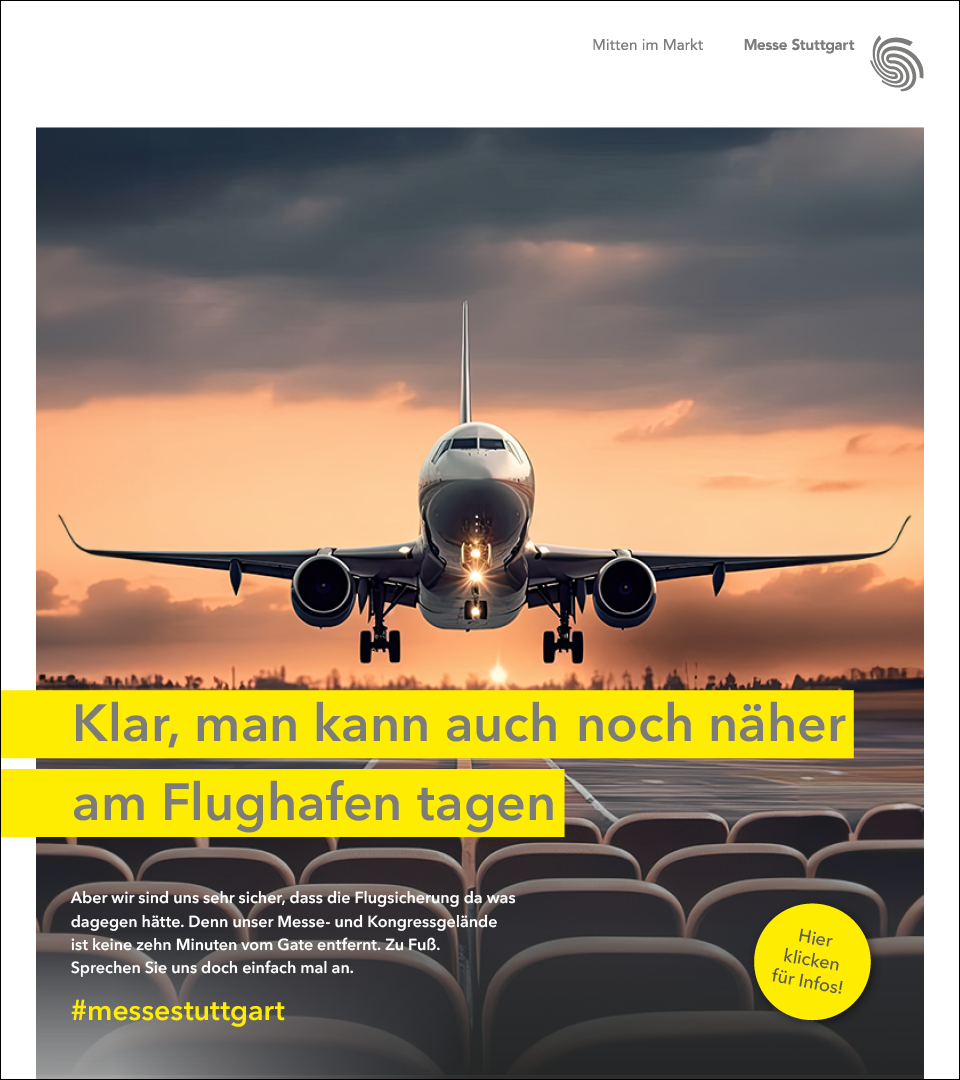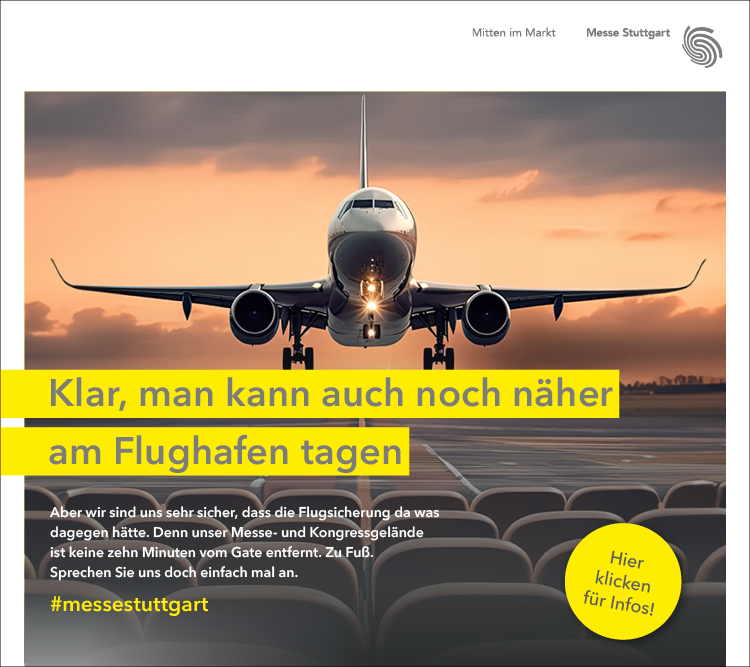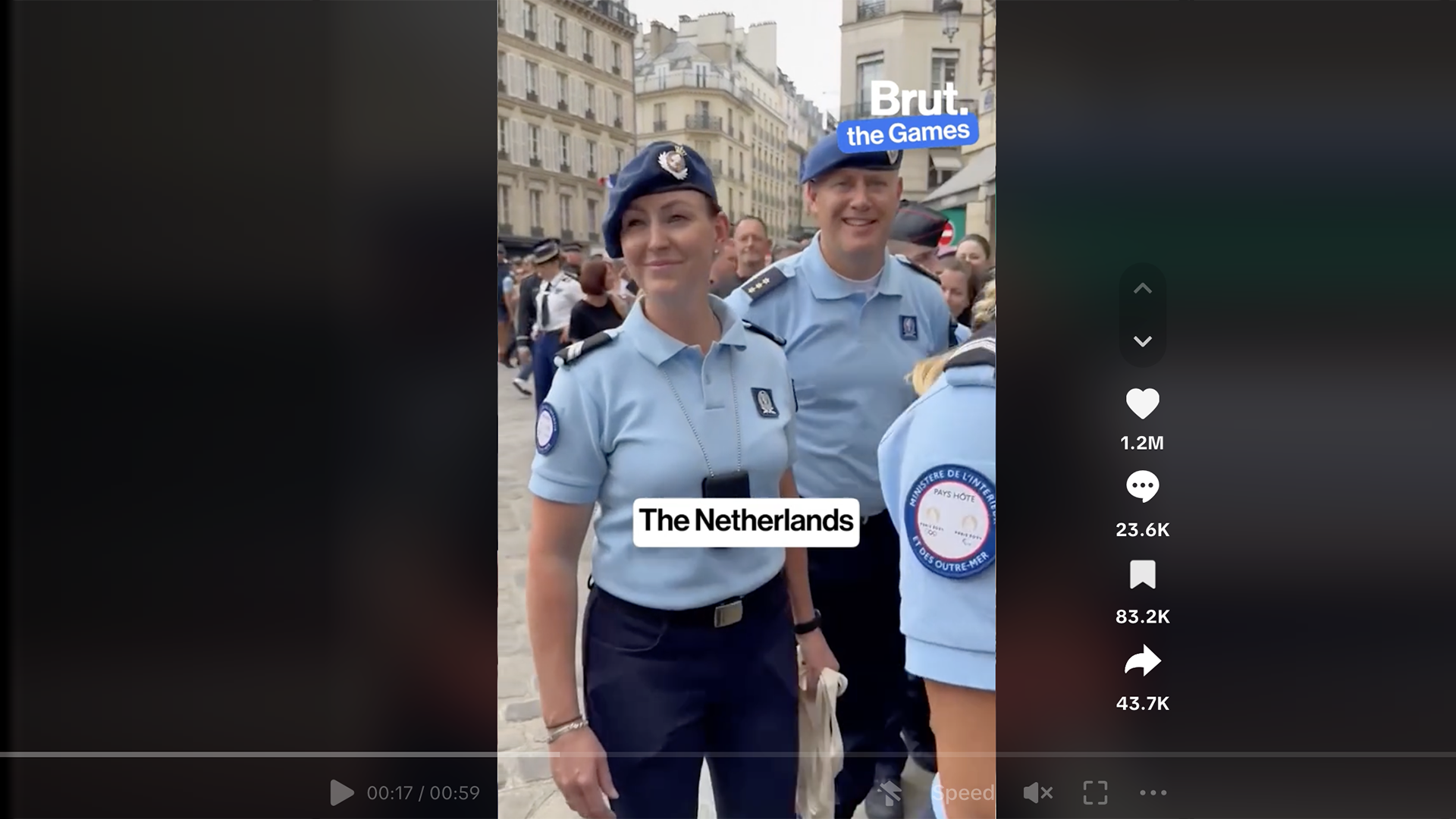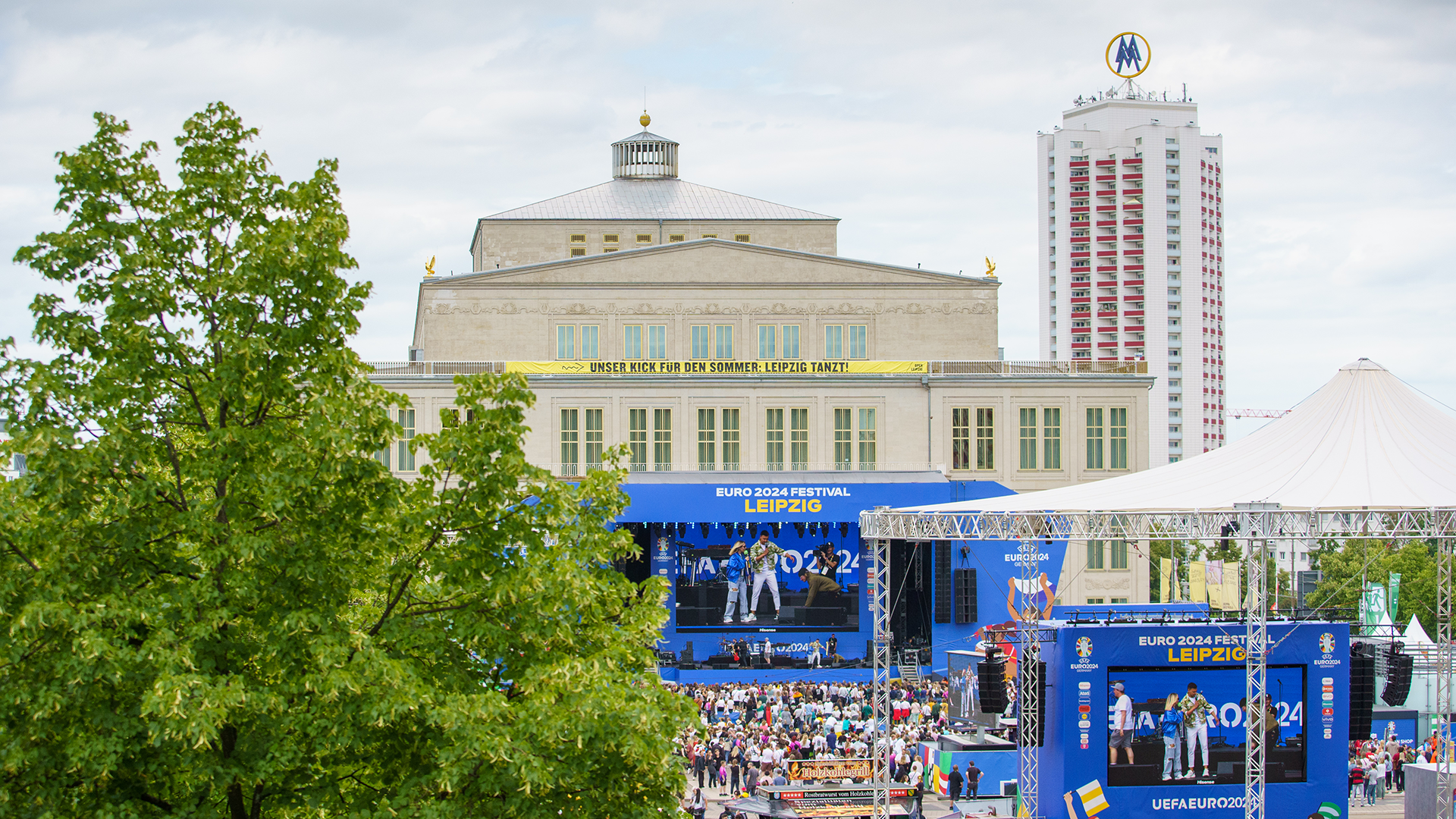
Security at events
But for sure
In fan zones like the one in Leipzig, thousands of people came together to watch football at UEFA EURO 2024. This meant that the matches could also be experienced outside the stadiums in public spaces. Photo: Leipzig Trade Fair Centre
In fan zones like the one in Leipzig, thousands of people came together to watch football at UEFA EURO 2024. This meant that the matches could also be experienced outside the stadiums in public spaces. Photo: Leipzig Trade Fair Centre
This year, security at events is a particular focus of public attention. People from all over the world have travelled to Europe for mega events such as the UEFA EURO 2024 and the Olympic Games in Paris - and the organisers have extended the event venues into public spaces. What event professionals can take away.
With a few last hot days, the summer 2024 mega-event is drawing to a close. The world came together to celebrate a new European football champion and sporting hero of the Summer Olympics. There was a sigh of relief after the tournament summer went so peacefully, despite all the fears beforehand. This feeling was suddenly intermingled with the news of a knife attack at the Solingen city festival. Three people died. The attack was committed by a lone perpetrator who claimed responsibility for the attack. This raises a simple question for event professionals: how can such a situation be dealt with?
Safety at events is an omnipresent topic. It is about visitor safety, occupational safety, resident protection and more. In Germany, depending on the federal state, there are many rules in the Assembly Venue Ordinance that deal with precisely these areas.
"The fundamental focus is on safety, i.e. the physical integrity of the visitor. Of course, it is also important to ensure a safe environment for employees, artists and others involved," explains Dennis Eichenbrenner, Chairman of the bvvs (German Association for Event Safety), explaining the concept of event safety. The availability heuristic teaches us that whenever something happens and there is a lot of talk about it, people generally consider the risk of something happening to them to be higher. And a lot has happened this year, which has also been much discussed in the media.
Photo: Philipp Uricher
Safety takes time
Dennis Eichenbrenner is a specialist planner for event security and has been Chairman of the bvvs - Bundesverband Veranstaltungssicherheit since 2020. In this interview, he talks about the complexity of his specialist field and his impressions of EURO 2024 and the Olympic Games in Paris.
Terror attack in Moscow
At the beginning of the year, the terrorist organisation "Islamic State Khorasan Province" carried out an attack on Crocus City Hall in Moscow. Over 140 people lost their lives. This set the tone for the event year. Preliminary reports on UEFA EURO 2024 increasingly focussed on whether the football tournament would be safe. The final in the Olympic Stadium was even outlined as a "worthwhile" target for terrorists. "The danger is abstractly high and we are taking it seriously so that the abstract does not become concrete," said Herbert Reul, Minister of the Interior of North Rhine-Westphalia, to the ARD Sportschau in April.
The world would be there in real time via livestream or TV if something were to happen. Just to remind you of the Greenpeace campaign in Munich for the 2020 European Football Championship. A Greenpeace activist flew into the stadium with a paraglider for the opening match in Group F between Germany and France. However, he suffered a crash landing and injured a spectator.
Federal Minister of the Interior Nancy Faeser finally travelled through the host cities shortly before the opening match to get a media-effective picture of the state of preparations: "For me as Federal Minister of the Interior, security is a top priority. We are arming ourselves against all conceivable dangers with a high level of commitment from all security authorities. Our focus ranges from the threat of Islamist terror, hooligans and other violent criminals to cyber attacks."
During the round of 16 match in which the German national team played, a masked man climbed onto the roof of the Dortmund stadium. The incident was received with corresponding sensitivity by the public. People dressed up in Albärt mascot costumes made it onto the playing areas inside the stadium without being stopped. In the round of 16 match with Germany, a masked man climbed onto the roof of the Dortmund stadium. He was only arrested by police after the final whistle. Even if this was only about clicks on TikTok and unusual photos, it shows that a lot has to be expected.
Out of the stadium
After the UEFA EURO 2024 was before the Summer Olympics in Paris. The next mega-event that brought the world together. While large, publicly accessible fan zones were set up in the host cities for the EURO, traditional elements were reimagined for Paris 2024. The opening ceremony, for example, took place across the Parisian city centre around the Seine. It was moved out of a large stadium as a protected space and into the vulnerable public space. This creates new challenges for the protection of these events. Where over 600,000 spectators were initially expected to attend in Paris, the number was reduced to just over half shortly before the opening of the Summer Games.
IBIT24: 10th symposium for eventsafety and security.
The 10th IBIT24 Conference on Event Security will take place in Cologne on 15-16 October. It is a platform for the exchange and transfer of knowledge and is dedicated to discussing relevant issues relating to event safety and the safety of people in large crowds.
This year's torch relay before the opening of the Olympic Games in Paris also had to be rescheduled due to security concerns. The torch was actually supposed to be carried throughout France and the French overseas territories. Due to unrest in New Caledonia, the stage was cancelled. The surfing competitions still took place there. Speaking of the torch relay: This pre-event event is already a security issue in itself. In 2008, on the way to Beijing, the route through London had to be specially re-planned and the torch "packed" so that it would not be extinguished by protesters.
Michaela-Susan Pollok, Head of Event Management & Social Media at the Bundesverband Industrie Kommunikation (bvik), visited the Olympic Games in Paris and shared her insights on LinkedIn. When asked about her impressions of the security situation, she said: "Overall, I never felt threatened, but there were an extremely large number of emergency services out and about. From my point of view, they mainly served as a deterrent. The metro, on the other hand, was not well protected. The sometimes very lax bag and identity checks at the entrance were rather strange. London was much better equipped in this respect. But the information provided in advance via one of the three apps was very good, so you knew what you were allowed to bring with you."
Police forces secure mega events
Similar to the European Football Championships, security measures were reported months before the games. It was rumoured early on that it would be the largest police operation in Paris. From all over France, 45,000 police officers, 18,000 soldiers and another 18,000 to 22,000 private security personnel were mobilised.
In addition, police units from many participating nations travelled to the French capital to support the local police units. The involvement of foreign police units helps to minimise language barriers and discourage potential criminals from pursuing their crimes when they see the uniforms from their home countries. Meanwhile, videos from Paris went viral on TikTok, showing police officers from a wide range of nations.
Safety zones in Paris
The police and security forces protected a good 15,000 athletes who came together in well over 800 events over two weeks each for the Olympic and Paralympic Games in Paris. So-called SILT parameters were set up to further secure the individual venues. France has already had good experience with this concept at previous events. The SILT parameters map three levels of security zones around a venue. Only those with the appropriate authorisation can enter the zones through the gates. However, in order not to restrict residents and neighbours for too long, these zones were only set up a few hours before the event until an hour after the event. In addition, over 400 new cameras were installed. This created a network of 4,400 cameras across Paris, whose images were analysed in real time with the help of AI.
The Escape Pro project, a new crisis management software programme, was also introduced at police headquarters for EURO 2024 in Germany. It is able to simulate the flow of people in evacuation situations and is intended to increase the security of major events throughout Germany. This makes it easier to plan in advance how visitors can escape from a fan zone and at the same time get emergency services to emergencies as quickly as possible. Escape Pro is based on the simulation software "crowd:it", developed by accu:rate GmbH from Munich. With Escape Pro, "crowd:it" is now being adapted to the specific needs of the police so that it can also be used in the future.
Learnings für Event Professionals
Back to practice for event professionals. What can they take away for themselves? They should view security planning as a continuous process and involve experts to ensure both visitor and employee safety. When it comes to safety planning, Dennis Eichenbrenner advises using the concept of the customer journey. "Where does the visitor start? How do they get to the venue? How are the surroundings of the venue designed, the so-called last mile? How does the visitor get to the venue and what happens next?"
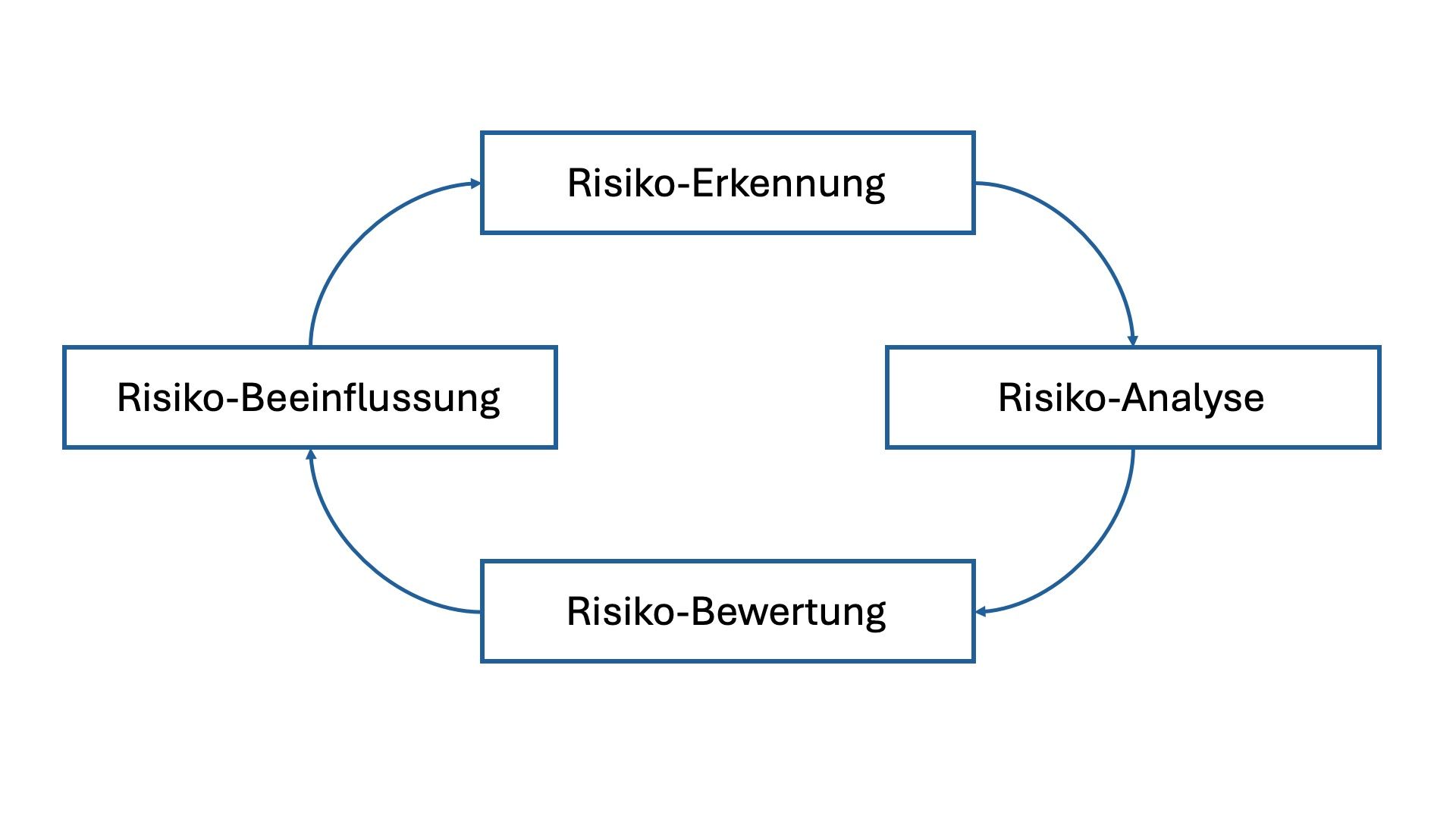
Risk management cycle model (own illustration according to Haag)
"A good start is made when a risk analysis is carried out after the event description and the dangers of the individual event are assessed," continues Eichenbrenner. Risk management provides event planners with a cycle model. He recommends involving experts in the planning once an event reaches a certain size. "A major component of visitor safety is the guests themselves, which is another reason why it is good to have educated and informed guests at events."
Every crisis is also a communication crisis
Steff Berger, crisis manager for events at VOBE inspires people, takes a similar view. "Explaining measures creates trust and promotes safety. Well-informed visitors behave more calmly and cooperatively in critical situations. Clarity and transparency prevent misunderstandings and panic." Because every crisis is also a communication crisis, says Berger.
Berger sees the training of the staff deployed as an important building block here. "The entire service staff - from hostesses to security and catering - are often the first point of contact. They need to recognise problems early on and know how to pass them on correctly. Communication is the key here: well-trained staff can react quickly and effectively, which not only protects the event, but also saves the team from unnecessary stress."
In everyday life, however, she sees challenges in providing staff with comprehensive training. Berger recommends three practical measures to raise awareness of emergencies within the crew: the creation of a booklet and a video as well as a declaration of commitment.
The booklet summarises rules of conduct, communication guidelines, emergency numbers and instructions for sending messages. The video illustrates the rules of behaviour even more clearly. And finally, signing a declaration of commitment ensures that the information in the booklet and video has been properly recorded. Berger also likes to look to the UK as a best practice case, where "health and safety" is a key issue for events.
An attack like the one in Solingen is very difficult to prevent. This makes it all the more important to make preparations in order to be able to act in an emergency. Even if it is mainly good communication that is needed. In conclusion, Steff Berger appeals: "Crisis management is not a luxury, but a necessity. It not only protects people, it also gives them the confidence that they are in good hands."
New for our international readers:
For the first time, we are offering an English version of our magazine in addition to the German edition. The translation was made with the help of AI and is currently in the test phase. We’d love to hear your feedback on this new service!
